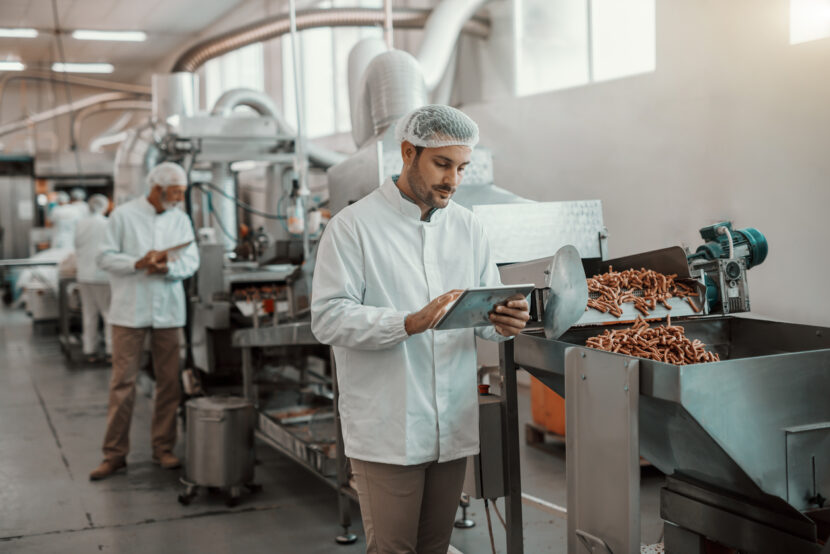The ComActivity Difference
Industry-specific business understanding and innovative technical know-how with an end-to-end perspective.

In today’s fast-paced and interconnected world, the global food and beverage (F&B) sector is undergoing a profound digital transformation. In fact, this evolution is driven by the integration of cutting-edge software technologies, particularly through supply chain and ERP solutions.
What’s more, these digital tools are reshaping the operational landscape of businesses, offering a distinctive competitive advantage and ushering in a revolution within the industry. If anything, it’s fundamentally changing the way F&B companies manage operations, streamline processes, and make informed decisions.
Certainly, momentum is building in multiple market sectors. In Australia, for instance, the F&B industry is experiencing a dramatic shift, unlocking fresh opportunities and “new ways of doing business,” according to Simon Piff, Vice-President of Practice Group at IDC Asia Pacific.
What’s driving this transformation? In part, a convergence of several key factors is shaping this transformative moment. These worldwide disruptions – whether geopolitical or natural/environmental occurrences – unprecedented levels of inflation, labour shortages, increasing regulatory requirements, escalating energy expenses, and an industry wrestling with shrinking profit margins. Consequently, businesses are now realising the need to reassess and revamp their operational approaches.
Moreover, a multitude of technological trends are steering this transformation. These encompass: optimising supply chains; refining inventory management; enhancing customer engagement; harnessing the power of data analytics; leveraging the Internet of Things (IoT); expanding e-commerce and delivery channels; integrating automation and robotics; bolstering quality control measures; embracing personalisation strategies; championing sustainability initiatives; bolstering food safety protocols; and complying with stringent regulatory requirements.
In response, F&B companies are actively embracing various tech-driven innovative opportunities in a bid to stay competitive and relevant to consumers – with data serving as the crucial catalyst, Piff says.
“Data is the focus of modernisation here. Consumer data, supply chain data and the ability to rapidly adapt to the challenges due to near real-time data capabilities is the technology that’s supporting F&B modernisation.”
Additionally, companies are proactively exploring digital-first strategies, recognising that the integration of data-driven technologies is instrumental in driving the digital transformation that’s reshaping the F&B sector, both in Australia and on a global scale.
But are the IT leaders – those on the frontlines of innovation – receptive to the change?
“Very receptive,” according to Andrew Atkin, a veteran F&B practitioner with over 13 years as the head of IT for Lindt & Sprungli. “Either your competitor already has a technological advantage, so you need to catch up; or you want to be first to market with a technological advantage,” he said, urging companies to become more digitally focused.
Tech transformation in the F&B space is happening on several fronts, with a focus on speed, tracking, and data. Atkin highlights the importance of speed in processing customer orders, tracking orders, and harnessing supply-chain data, including point-of-sale (POS) transaction data.
In this comprehensive transformation, emerging technologies play a pivotal role in reshaping the F&B sector. These technologies are leveraged to:
Utilise Data & Insights for Greater Visibility and Traceability: Businesses are harnessing data and insights across the supply chain to enhance visibility and traceability, ensuring seamless collaboration among all stakeholders.
Integrate AI, Automation, and Transformative Technologies: AI, automation, and other transformative technologies are being integrated to bolster the competitive advantage of F&B businesses, optimising operations and driving innovation.
Mitigate Supply Chain Risks and Enhance Resilience: Technology is used to identify and mitigate supply chain risks, enhancing transparency and improving the industry’s overall resilience in the face of challenges.
In summary, the digital transformation of the F&B sector is not a singular event, but a dynamic process driven by the integration of advanced software technologies, data-driven insights, AI, automation, and a digital-first mindset.
These tech-driven factors collectively reshape how businesses in the F&B sector operate, innovate, and adapt to the rapidly changing demands of consumers and the industry landscape.
ComActivity are end-to-end Food and Beverage experts – contact us today to learn more why digital transformation can benefit your business.